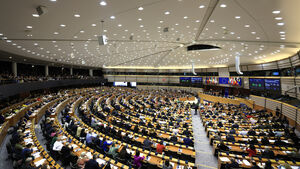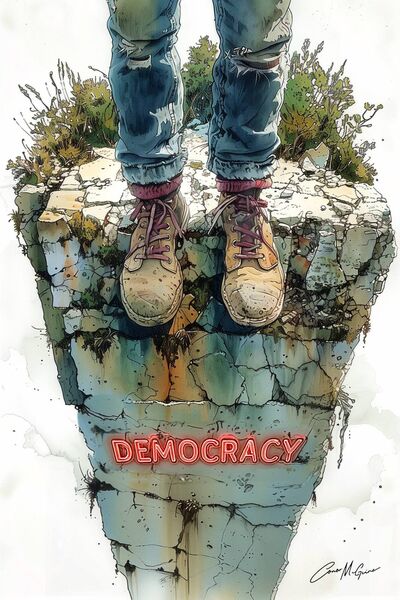Democracy dies if society becomes hopelessly polarised

A new generation of politicians is taking its place in the European Parliament. Picture: AP Photo/Geert Vanden Wijngaert
There's a storm brewing over the European continent, a great swell of silent majorities yearning to be heard. Across Europe's plains and valleys, an undercurrent of discontent rumbles, growing inexorably into a riptide that threatens to sweep away the cosy Davos consensus of our modern princes.
From Paris to Dublin, a new breed of politicians is rising, giving voice to the voiceless legions who have languished in the peripheries as our self-appointed betters dictated their grand visions from on high. They channel the grievances of the disenchanted, the displaced, the damned souls of a European dream sold for a paradigm of bureaucratic diktats and mass migration.
You can smell the fear among the mandarins of Brussels, branding these new forces as knuckle-dragging mouth-breathers, spitting invective at the barbarian hordes gathering at the gates. How dare the great unwashed demand a say in the onward march of open borders and regulation? 'Beware the radical right,' shriek the enlightened ones, blissfully blind to the irony of their own extremism.
Pause momentarily, and one hears authentic human cries amid the caricatured slogans. The angst of working men and women who have watched their communities hollowed out by the centrifugal forces of globalisation. The anger of those whose cherished liberal values have been corrupted and contorted into strange new dogmas, forcing compliance over free expression. These are not fringe concerns but the entirely reasonable anxieties of decent people chewed up and spat out by the machinations of rapacious capitalism and social engineering gone awry.
So, let us not be too hasty to condemn the Marions and Melonis as crypto-fascists. For all their fiery rhetoric, their fundamental demand is simply this: that the people might be heard, that those crafting the social contract should emerge blinking from the bunkers of bureaucracy to behold the lives of those they profess to represent.
How curious this premise, the bedrock of any functional democracy, should scandalise our modern philosophers. These are meant to be the arch-rationalists, steered by pure logic and empiricism, devoid of cultural nostalgia. Yet when the raw data conflicts with their theoretical models, they merely double down and brand the numbers invalid.

Take the issue of immigration, that of the populist rebel. Is it really so extreme to suggest some semblance of control over the tide of human movement across borders? To accept people pragmatically, with an eye to social cohesion and sustainable levels of public service? The European Union's own forecasters predict a doubling of immigration over the coming decades, with all the monumental challenges that entails. Yet those who urge prudence are swiftly excommunicated, cast into the outer darkness as irredeemable hatemongers.
Ireland has not remained immune to these forces despite its geographical isolation. Here, too, one discerns a groundswell of discontent, amplified by the inescapable evidence of haphazard planning and heedless social flux. Aspiring politicos give full-throated voice to these concerns, prompted by pollsters who confirm their cause has traction.
Observing how the Irish establishment reacts to this new reality will be instructive. Our Mandarin caste tends to mimic the postures of the continental Europeans, so one imagines the familiar pyrotechnics of demonisation and attacks of faux outrage. We shall hear that age-old mantra that Ireland has a fluid ethnic nationalist tradition, that its people are irredeemably civic and multicultural. With glib sophistry, our rulers will again reason themselves into ignoring legitimate grievances.
And yet, for all their lip service, our princes have hardly covered themselves in glory on integration and immigration thus far. The housing and public services crises occasioned by decades of haphazard policies speaks to a fundamental laissez-faire mindset, one rooted more in political indifference than any lofty ideals. The same lack of foresight now threatens to propel Irish dissenters into the arms of more extremist movements that purport to offer answers.
Before we sleepwalk into a deepening culture war, it would be wise for all sides to dismantle their respective caricatures of one another. Those railing against globalisation should consider what the alternatives to transnational cooperation might entail in a hyper-connected world. Our incumbents, meanwhile, must indeed accept that their policies and prescriptions have landed us in a morass of dysfunction and inequality.
For too long, the so-called liberal centrists have enjoyed a monopoly on defining the bounds of legitimate discourse. Any who depart from their agreed script are swiftly cast out into the darkness of a demonised right, their concerns ridiculed as the ravings of bigots and backwoods bruisers. It is a posture riddled with intellectual dishonesty and ultimately corrosive of the democratic compact.
In branding any dissent as beyond the pale, our modern philosophers fail to uphold the core liberal values they profess to cherish. They become the very authoritarians they claim to reject, brooking no debate and denigrating all who deviate from their ordained dogma. True liberalism demands the constant re-examination of orthodoxies and a willingness to evolve through the assimilation of new evidence and perspectives.
Our political discourse has grown dangerously out of kilter from this cherished ideal. Rather than a forum for the robust exchange of ideas, we find ourselves in a sterile impasse of duelling absolutisms - one side brandishing the cross of diversity, the other waving tattered banners of ethnic identity. Each camp screams itself hoarse, ever more detached from the quotidian realities experienced by ordinary people trying to muddle through.
Is it possible to find some golden mean, some still point between polarised fanaticisms? To acknowledge the scale of the challenges mass migration presents while reaffirming humanist opposition to prejudice? To critique the failures of multiculturalism without lapsing into nativism? To demand evolution in social norms and integration efforts without trampling individual liberties?
These are not irreconcilable positions for a mature, reasoning society. But they demand a blessed combination of attributes we have grown unaccustomed to - nuance, empathy, intellectual honesty and a stubborn commitment to democratic discourse - a counterweight to the baying echo chambers and identity factions convulsing the body politic.
However distasteful the rhetoric, the populist rebels give voice to a legitimate societal schism, one that grows more grave with each election cycle. To condemn them as merely deplorable, to lecture and shame them into obedience, is only to deepen the divide. The growing numbers now estranged from our institutions and values are not a mirage that shall dissipate through sheer force of political sanctimony.
I sincerely hope the dialogue begins anew with a recognition that beyond our demarked bubbles, swathes of people feel left behind by the headlong transformations recasting our societies. To ignore their concerns, to diminish their existence as little more than the griping of ingrates is to court a dissolution that will render tomorrow's political pieties as obsolete as yesterday's racial mythologies.
The storm winds are rising and won't be turned back by scolding and scorn. Our political classes should heed the rage as a cry for existential recognition, a righteous rejection of creeds that have failed to protect our ancestral traditions and liberties. In banishing the authentic voices of dissent to the outermost peripheries, we debase the democratic enterprise we pretend to uphold.
We can only hope that good faith reigns on all sides. That effort alone can salve the sores and heal the rifts between the disenfranchised citizens and their appointed shepherds. If we profess to cherish pluralism, then we must welcome all to the table and meet them on the level ground of reason. To deny them is to deny the very foundations of our liberal democracy.
The swell of the local and European elections is just past. It would be wise to prepare the dykes and dams of reason lest we drown in the coming seismic upheaval of a fraught General Election.




